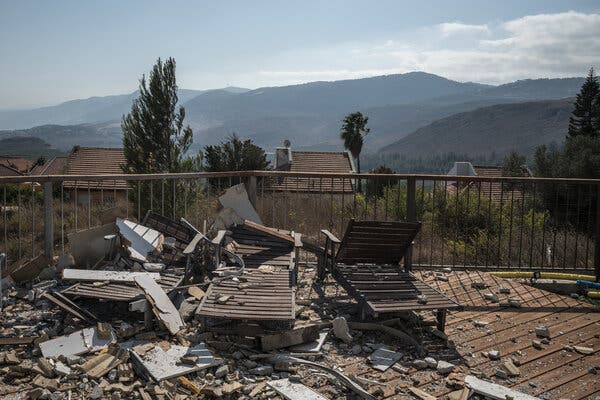The president was asked about a potential strike on the oil infrastructure of Iran, which accounts for about 2 percent of the world’s supply.

Oil prices jumped on Thursday, after President Biden, when asked if he would support an Israeli strike on Iran’s oil facilities, said: “We’re discussing that. I think that would be a little … anyway.”
The market moves reflected continued nervousness about a potential Israeli military retaliation against Iran, which launched a barrage of missiles across Israel on Tuesday, doing little damage but increasing fears of an all-out war in the region.
Oil prices rose more than 4 percent on Thursday, with Brent crude, the global benchmark, climbing above $77 a barrel for the first time in a month after Mr. Biden’s remarks. Before the missile attack, Brent was trading at just above $71 a barrel.
Prime Minister Benjamin Netanyahu of Israel said after Iran’s attack on Tuesday that Tehran had “made a big mistake — and it will pay for it.”
When asked if he would allow Israel to retaliate against Iran, which said it had launched the missiles in retaliation for the assassinations of leaders of Hamas and Hezbollah, its proxies, Mr. Biden said: “First of all, we don’t ‘allow’ Israel. We advise Israel. And there is nothing going to happen today.”
Iran is a major oil producer, pumping about two million barrels a day, or about 2 percent of the world’s supply. Its production and sales are hampered by international sanctions, and most of its exports are bought by China.
The intensifying fighting between Israel and Iran and Iranian-backed groups, especially Hezbollah in Lebanon, has pushed up oil prices this week. The main concern is that the escalating conflict could prompt Tehran to try to restrict the flow of oil from key exporters like Saudi Arabia and the United Arab Emirates.
Prices haven’t climbed back to their peaks this year, however, because those worries have been largely outweighed by factors like weak energy demand in China and increased oil production in the United States and elsewhere.
An agreement reached in June by Saudi Arabia and seven other oil producers to begin unwinding some production cuts also continues to weigh on prices. While these increases were recently postponed, the anticipation of increased supplies coming onto the market has offset some of the worry about potential outages stemming from fighting between Iran and Israel.
Until recently, oil prices had been steadily drifting lower, down from about $90 a barrel six months ago.
Jason Karaian is the business news director, based in London. He was previously the editor of DealBook. More about Jason Karaian
Stanley Reed reports on energy, the environment and the Middle East from London. He has been a journalist for more than four decades. More about Stanley Reed
See more on: Israel-Hamas War News, President Joe Biden, Hezbollah, Benjamin Netanyahu



